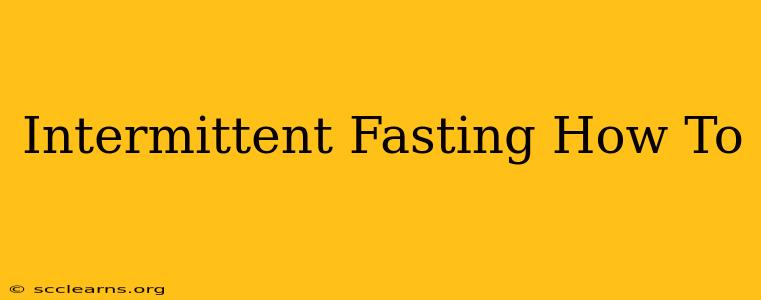Intermittent fasting (IF) is a popular dietary strategy that cycles between periods of eating and voluntary fasting on a regular schedule. It's not about what you eat, but when you eat. This guide will delve into the different methods, benefits, potential drawbacks, and how to safely and effectively incorporate intermittent fasting into your lifestyle.
Understanding Intermittent Fasting Methods
Several popular intermittent fasting methods exist, each with its own approach:
1. The 16/8 Method (Leangains):
- What it is: This involves fasting for 16 hours each day and consuming all your meals within an 8-hour eating window. For example, you might eat between 12 pm and 8 pm.
- Pros: Relatively easy to implement, allows for flexibility within the eating window.
- Cons: May not be suitable for everyone, especially those with specific health conditions or medication schedules.
2. The 5:2 Diet:
- What it is: You eat normally for five days of the week and restrict your calorie intake to 500-600 calories on two non-consecutive days.
- Pros: Allows for more flexibility in daily eating habits.
- Cons: Requires careful calorie tracking on fasting days and can be challenging to maintain long-term.
3. Alternate-Day Fasting:
- What it is: You consume a very low-calorie diet (around 500 calories) on one day and eat normally on the next.
- Pros: Potentially significant weight loss.
- Cons: Can be difficult to maintain, may lead to nutrient deficiencies if not planned properly, and can be quite restrictive.
4. Eat Stop Eat:
- What it is: A 24-hour fast once or twice a week.
- Pros: Straightforward approach.
- Cons: Can be challenging, requires significant willpower, may not be suitable for beginners.
Benefits of Intermittent Fasting
While more research is needed, intermittent fasting shows promise in several areas:
- Weight loss: By reducing your overall calorie intake, IF can lead to significant weight loss.
- Improved insulin sensitivity: IF may improve your body's response to insulin, reducing your risk of type 2 diabetes.
- Cellular repair: Fasting may trigger cellular repair processes, promoting longevity.
- Reduced inflammation: Some studies suggest IF may reduce inflammation in the body.
Potential Drawbacks and Considerations
Before starting any intermittent fasting plan, consult your doctor, especially if you have:
- Underlying health conditions: Diabetes, heart disease, or eating disorders.
- Are pregnant or breastfeeding: IF is not recommended during pregnancy or breastfeeding.
- Take medications: IF may interfere with medication absorption.
Other potential drawbacks include:
- Hunger and fatigue: Initially, you may experience hunger and fatigue, but these usually subside as your body adapts.
- Headaches and dizziness: These are common side effects, especially in the beginning.
- Nutrient deficiencies: If not planned properly, IF can lead to nutrient deficiencies. Focus on nutrient-dense foods during your eating window.
- Social limitations: IF may make it challenging to participate in social events involving meals.
How to Start Intermittent Fasting Safely
- Start slowly: Don't jump into a strict fasting regimen immediately. Begin with a less restrictive method, such as the 16/8 method, and gradually increase the fasting duration as your body adapts.
- Listen to your body: Pay attention to hunger cues and adjust your plan accordingly. Don't push yourself too hard, especially in the beginning.
- Stay hydrated: Drink plenty of water, unsweetened tea, or black coffee during your fasting periods.
- Focus on nutrient-dense foods: Make the most of your eating window by consuming whole, unprocessed foods packed with nutrients.
- Plan your meals: Prepare your meals in advance to avoid making unhealthy choices when hungry.
- Be patient and consistent: Results take time. Stay consistent with your chosen method for optimal results.
Intermittent fasting can be a powerful tool for weight management and overall health. However, it's crucial to approach it cautiously, listen to your body, and consult with a healthcare professional before starting. By understanding the different methods and taking a gradual, mindful approach, you can safely and effectively incorporate intermittent fasting into your lifestyle.

